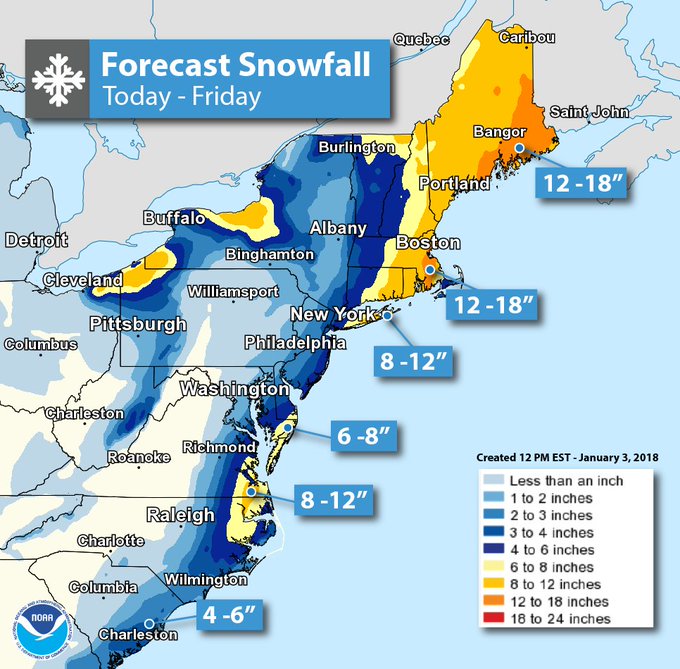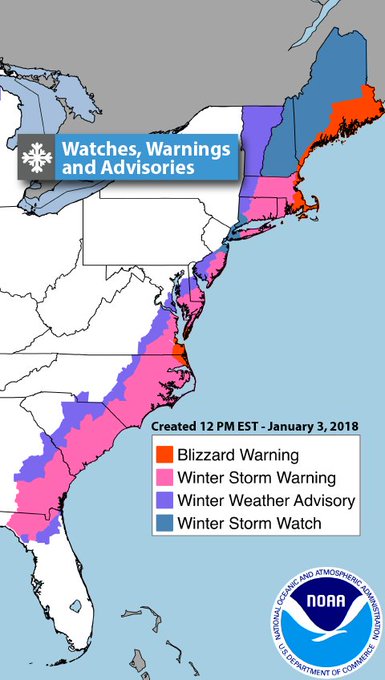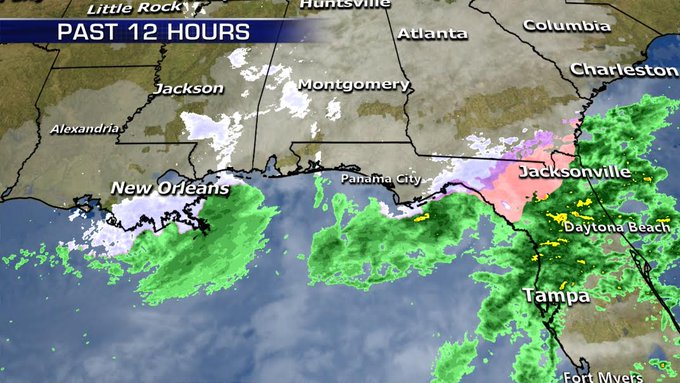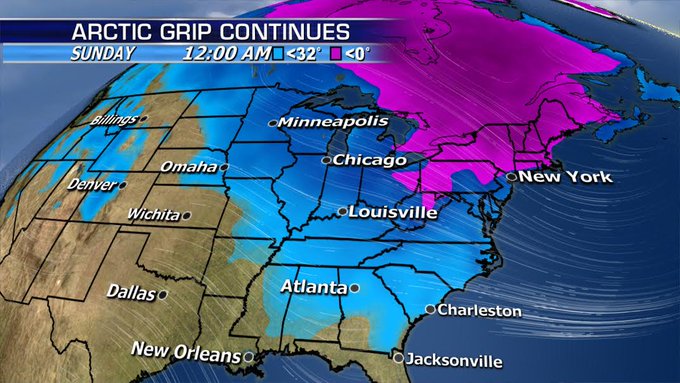A "bomb cyclone" is set to take aim at the Northeast after dumping snow and ice Wednesday across places that rarely see winter weather, the latest bombardment of frigid weather that's brought freezing temperatures to vast portions of the United States.
The National Weather Service said Wednesday a mix of snow and freezing rain is moving along the East Coast from Florida to North Carolina before rapidly strengthening at sea.
The weather service warned a so-called “bomb cyclone” will bring “blizzard conditions" across portions of eastern New England late Thursday.
"This winter storm is forecast to bring the potential for a mix of freezing rain/sleet/snow from portions of northern Florida to North Carolina, and snowfall northward along portions of the Mid-Atlantic into northern New England," the NWS said in an advisory.
According to the National Oceanic and Atmospheric Administration, bombogenesis or bomb cyclone “occurs when a midlatitude cyclone rapidly intensifies, dropping at least 24 millibars over 24 hours. A millibar measures atmospheric pressure."
"This can happen when a cold air mass collides with a warm air mass, such as air over warm ocean waters. The formation of this rapidly strengthening weather system is a process called bombogenesis, which creates what is known as a bomb cyclone,” NOAA said.
Winter Storm Warnings stretch from Florida to New England. (Fox News)
The NWS issued a Winter Storm Warning for all of Southeast Georgia, Interstate 10 corridor in Northeast Florida, and portions of the North and South Carolina coasts due to the possibility of ice and snow. The agency warned areas along coastal areas of New Jersey and the Mid-Atlantic could see up to 6 inches of snow, while parts of New England may see over a foot and high winds, prompting a Blizzard Warning.
"The storm will then have explosive strengthening over the Gulf Stream in the Atlantic, bringing hurricane-force winds and blizzard conditions for parts of coastal New England tomorrow," Fox News Senior Meteorologist Janice Dean said Wednesday.
"A mix of freezing rain, sleet then snow is making travel difficult if not impossible for areas stretching from north Florida to the coastal Carolinas and southeast Virginia," she said.
Future radar shows the effects from the "bomb cyclone" as it approached the Northeast. (Fox News)
In Brunswick, Georgia, on the Atlantic coast, law enforcement agencies reported freezing rain and ice on bridges early Wednesday in south Georgia as the storm revved up along the East Coast. Brunswick police reported on their official Twitter account that area bridges iced up.
The icy conditions also were hampering early morning travel in Florida, as authorities were forced to shut a stretch of Interstate 10 east of Tallahassee.
It even snowed briefly in Tallahassee, Fla. for the first time in 28 years, which brought reactions from residents who never see the white stuff.
Sharon Rosenberg, a 35-year-old physical therapist who has lived in the state capital her entire life told the Associated Press she didn't think it was going to happen, and then "literally two seconds later it started snowing."
Savannah Mayor Eddie DeLoach urged residents to stay home and keep off the roads. The city, which has not seen measureable snowfall since 2010, saw a mix of of snow and sleet. Nick McCready, who made a 25-mile commute from Savannah to Bluffton, South Carolina, before dawn Wednesday, told the AP there were "accidents all over."
Two Savannah Chatham Metro Police officers set up a barricade in front of a bridge that was closed due to ice on the road, Wednesday, Jan. 3, 2018, in Savannah, Ga. (AP Photo/Stephen B. Morton)
"On my way back, I slid a little bit on a couple of bridges," he said.
Georgia Gov. Nathan Deal and North Carolina Gov. Roy Cooper each declared a state of emergency in their respective states due to the storm system. Airports in South Carolina and Georgia also closed as snow and ice fell along coastal areas.
Jan. 2, 2018: A coin operated binocular is covered with snow on Goat Island at Niagara Falls State Park in Niagara Falls, N.Y. (James Neiss/The Niagara Gazette via AP)
Several other parts of the U.S. were expected to experience dangerously cold temperatures as well.
The National Weather Service issued wind chill advisories and freeze warnings Tuesday covering a vast area from South Texas to Canada and from Montana through New England. After the storm exits the area, more bitter cold is expected to pour in for the weekend, according to Dean.
A forecast map showing temperatures expected by midnight on Sunday across the country. (Fox News)
"Some areas could see over a foot of snow, and the exact track of this storm is still yet to be determined ,so people should be prepared for possible power outages and several inches of snow along with even cold air with windchills below zero heading into the weekend," Dean said Wednesday. "This will be life-threatening if people are still without power."
Jan. 2, 2018: Small patches of ice formed along the banks of the Hudson River near the George Washington Bridge in Fort Lee, N.J. (AP)
The cold weather has already been blamed for at least a dozen deaths as well as freezing a water tower in Iowa and halting ferry service in New York.
Indianapolis saw temperatures reach a whopping low of -12 degrees, tying a record low set in 1887. Chicago-area wind chills were also expected to between -35 and -20 degrees.
Traveling in the ice and snow has also proven to be treacherous.
At least one person was killed in upstate New York in an accident involving dozens of vehicles on I-90 east, WIVB-TV reported. At least 11 others were hospitalized.
Plunging temperatures in Texas brought rare snow flurries as far south as Austin, and accidents racked up on icy roads across the state. The Abilene police chief said more than three dozen vehicle crashes were reported in 24 hours.
Officials in Michigan said dozens of cars piled up in crashes on Sunday, according to the Detroit News. Officials said there were no deaths reported in the crashes, but there were at least seven hospitalized.
The Associated Press contributed to this report.













